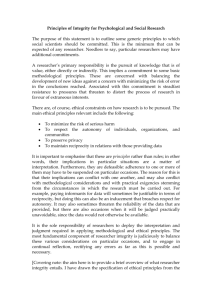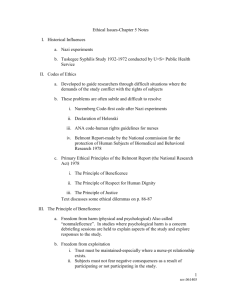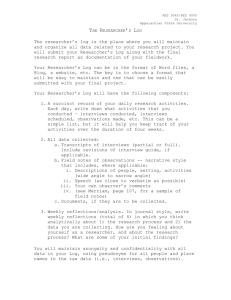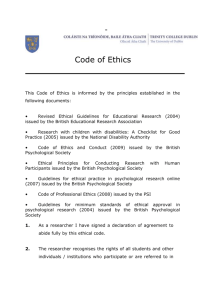RESEARCH ETHICS POLICY - Cape Peninsula University of
advertisement
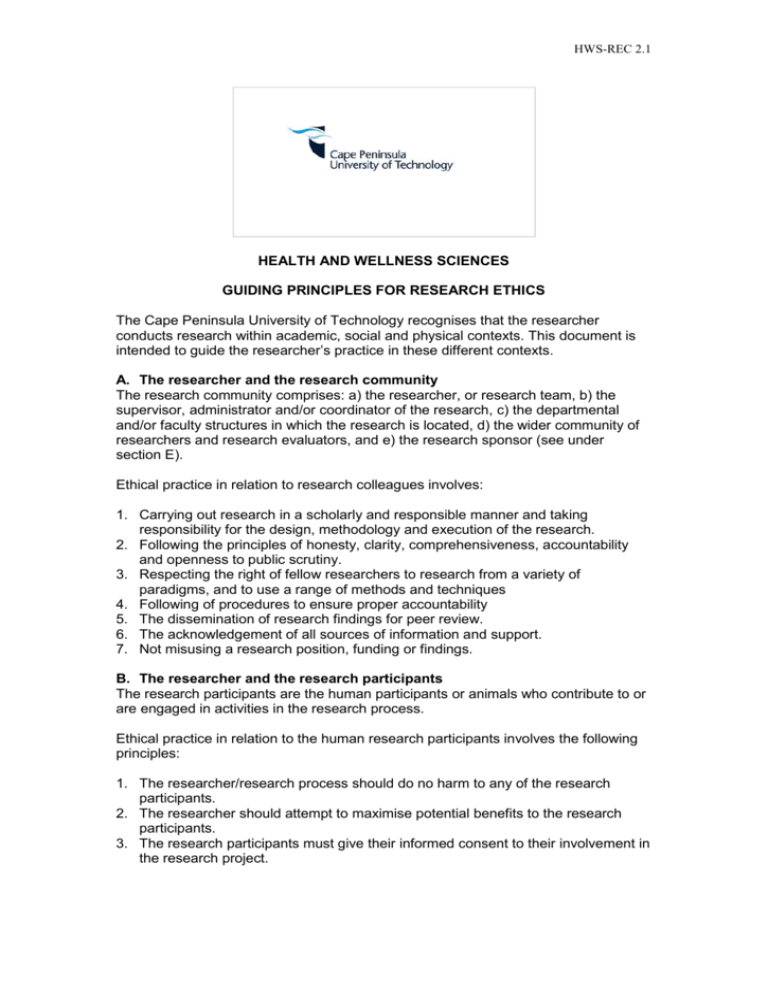
HWS-REC 2.1 HEALTH AND WELLNESS SCIENCES GUIDING PRINCIPLES FOR RESEARCH ETHICS The Cape Peninsula University of Technology recognises that the researcher conducts research within academic, social and physical contexts. This document is intended to guide the researcher’s practice in these different contexts. A. The researcher and the research community The research community comprises: a) the researcher, or research team, b) the supervisor, administrator and/or coordinator of the research, c) the departmental and/or faculty structures in which the research is located, d) the wider community of researchers and research evaluators, and e) the research sponsor (see under section E). Ethical practice in relation to research colleagues involves: 1. Carrying out research in a scholarly and responsible manner and taking responsibility for the design, methodology and execution of the research. 2. Following the principles of honesty, clarity, comprehensiveness, accountability and openness to public scrutiny. 3. Respecting the right of fellow researchers to research from a variety of paradigms, and to use a range of methods and techniques 4. Following of procedures to ensure proper accountability 5. The dissemination of research findings for peer review. 6. The acknowledgement of all sources of information and support. 7. Not misusing a research position, funding or findings. B. The researcher and the research participants The research participants are the human participants or animals who contribute to or are engaged in activities in the research process. Ethical practice in relation to the human research participants involves the following principles: 1. The researcher/research process should do no harm to any of the research participants. 2. The researcher should attempt to maximise potential benefits to the research participants. 3. The research participants must give their informed consent to their involvement in the research project. HWS-REC 2.1 4. The researcher should uphold research participants’ rights with regard to respect for human dignity, the safeguarding of confidentiality or anonymity, and the right to information. 5. Attention must be given to the specific ethical issues related to research involving vulnerable participants. For example, permission must be obtained from parents/guardians when the research participants or participants are minor children. C. The researcher and the environment The environment is defined as the particular physical context in which the research is conducted. Ethical practice with regard to the environment involves: 1. Minimising of harmful impacts on the environment and natural resources. 2. Adhering to accepted safety levels and standards when dealing with hazardous materials. D. The researcher and South African society ‘South African Society’ is defined as South African citizens and others who live in South African communities. Ethical practice with regard to the researcher’s responsibility to South African society involves: 1. A commitment to conducting research that will contribute to an improved quality of life for all South Africans. 2. Serving the needs of South African society as a whole. 3. Recognition of society's right of timely access to research findings and to open debate on their implications. E. The researcher and sponsors The sponsors of the research are individuals, institutions or organisations who support the researcher financially or in other substantive ways, or who commission the research for payment or other reasons. Ethical practice in relation to the research sponsors involves: 1. The fulfilling of contractual obligations with regard to the meeting of specific outputs within specified timeframes. 2. Making available research findings within the specified timeframes. In areas of potential conflict of interest: a) The safeguarding of the participants’ rights should take precedence, for example with reference to confidentiality and anonymity. b) The integrity of the research process should not be comprised by the demands of the research sponsors. F. Document reviewed annually Last reviewed: April 2008 ADDITIONAL DOCUMENTS i Code of ethics for biosafety (HWS-REC 3.1) HWS-REC 2.1 ii Code of Ethics for research involving human participants (HWS-REC 3.1) iii Human Participants’ Review Application (HWS-REC 3.1) iv Application for Ethical Clearance for the use of Animals (HWA-REC 4.3)


